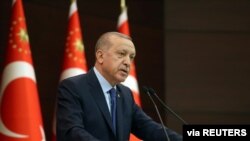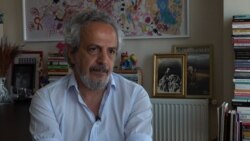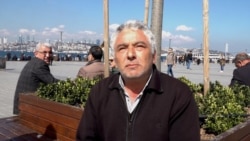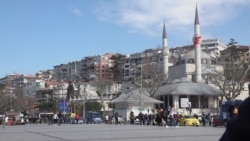Turkish President Recep Tayyip Erdogan is facing twin challenges from former key allies as discontent grows over a sluggish economy and deteriorating human rights.
Earlier this month, Ali Babacan launched the Deva Party, which means remedy. The party's message is of greater rights, democracy and gender equality.
Babacan, once Turkey's economic czar presiding over the country's most prosperous years, was among Erdogan's closest allies. Now Babacan is seeking to end Erdogan's nearly two-decade-long iron grip on power.
Gender equality is an important principle, with the party employing a 30% quota for women to hold positions in the party.
"The main purpose of this party is democracy, freedom and equality. So, this is what I believe, the freedom of speech, gender equality," said Sanem Oktar, the founder of Kagider, which is Turkey's Women's Entrepreneurs Association, and one of Deva's founders.
Oktar says she was drawn into politics and Deva because of the critical moment Turkey is facing.
"Every 20 years the society needs to change," Oktar added. "I feel that Turkey was a little boy who wears a T-shirt. But the T-shirt does not fit the boy right now; we need a bigger T-shirt right now, for more freedom, more equality. That is what society is looking for right now."
Since the 2016 botched military takeover, tens of thousands of people remain imprisoned while hundreds of thousands of others have lost their jobs in a post-coup crackdown, which continues to this day.
According to international rights groups, Turkey remains among the world's worst jailer of journalists. Erdogan defends the crackdown, maintaining that Turkish democracy still faces threats from followers of U.S.-based Turkish cleric Fethullah Gulen, blamed for the coup attempt. Gulen denies the accusations.
Disillusionment over Erdogan's rule saw his former prime minister, Ahmet Davutoglu, launch the Future Party, or Gelecek Partisi, in December.
Davutoglu is seeking to court the religious base of Erdogan's ruling AKP.
The Future Party commercials on social media rely heavily on the corrupt-free image of Davutoglu, a potent image given the persistent rumors of massive graft haunting Erdogan's years in power.
Erdogan's increasing centralizing of power around himself and close family, analysts say, has weakened the once inclusive coalition of views that made the ruling AKP an unstoppable political force.
"Those who are running AKP Party are not composed of, do not represent the diversity of the conservatives, even the religious people in Turkey," said sociologist Mesut Yegen.
"That means those who are about to build this new party will basically tell the Turkish people that, ‘OK, we need a kind of much more diverse and much more inclusive conservative-liberal party,’ " added Yegen.
One of the main factors widely cited as why Erdogan has remained in power for nearly two decades is that he has prevented the emergence of an alternative center-right political party.
A decade ago, another close Erdogan ally, Abdullatif Sener, left AKP and formed the Turkey Party, citing disillusionment over alleged widespread government corruption.
The party didn't last long. Businesses of party donors received visits by tax officials, members lost their jobs, and the party collapsed.
History could be repeating itself. Within weeks of Davutoglu launching his party, Sehir University, which he helped found, despite being academically acclaimed and successful, was taken over by authorities on allegations of financial irregularities.
The Bisav cultural foundation set up by Davutoglu was also taken over by the state in January. Some of the founding members of both new parties have reportedly lost their jobs.
"Of course, I am worried," said Oktar. "But, you know if you’re on your path, and you say the truths of the society and your plans, I think it can be heard."
Recent studies indicate there may well be a receptive audience to both the Future Party’s and Deva's message of greater rights. The Pew Research Center recorded a jump in support for media freedom in Turkey in the past three years, from 45% to 64%.
The same study saw an even more significant surge in support over the same period for freedom of speech, from 43% to 65%, which was the most significant increase in all the countries surveyed by Pew.
"The Pew findings indicate even middle-class AKP voters wish for a kinder, gentler Turkey, which Erdogan refuses to deliver," said analyst Atilla Yesilada of Global Source Partners.
"Whether Erdogan becoming increasingly at odds with the constituency will shake Turkey's fragile equilibrium is a question we shall see with Mr. Babacan," added Yesilada.
But given Babacan's and Davutoglu's critical roles in Erdogan's government, convincing voters they can deliver a new vision is likely to be challenging.
Istanbul's Uskudar district was once a stronghold of Erdogan, but recent local polls show a significant drop in support for the ruling AKP. However, there appears to be hesitation toward the new party leaders.
"If you look at the founders of these two parties, they both come from the same party," said Kasim, a retiree.
"One was the former prime minister with his Syria politics, and because of him, we are still over our head with the Syria trouble," he added. "The other was the minister in charge of the economy who had said, ‘We don't need to produce anything as a country,’ and agreed with everything that went on."
"I don't think they will have any chance," said Omer, a student. "That's what I think. Nobody should forget where the leaders of these new parties came from. They are all the same."
Overcoming skepticism and voter apathy are widely seen as key for these new challengers to Erdogan, although opinion polls do indicate strong support for the idea of new political parties. The next elections in Turkey are not due until 2023, but there are expectations of an early vote.












